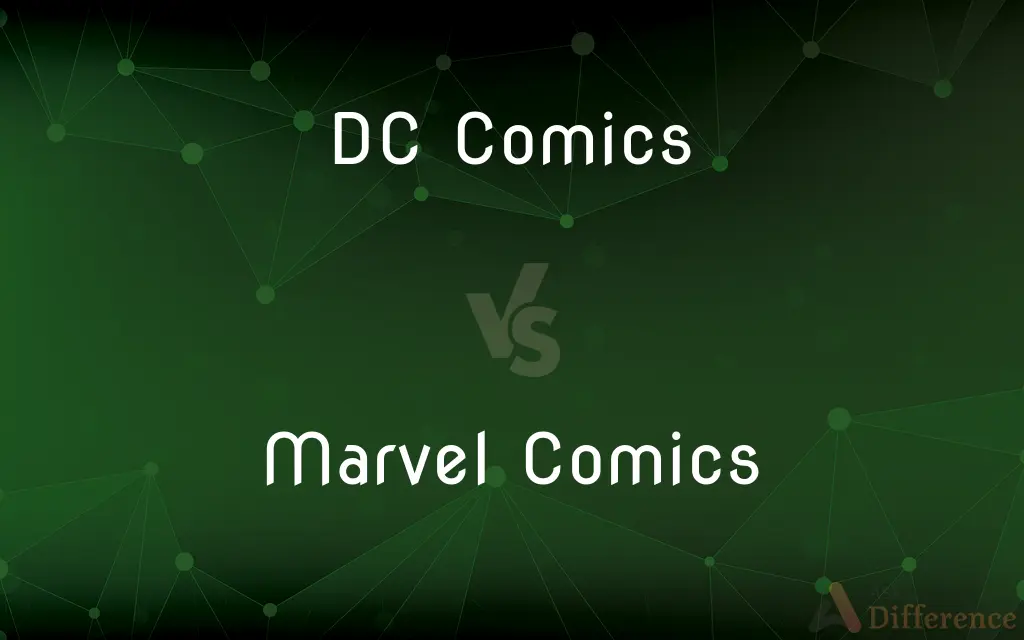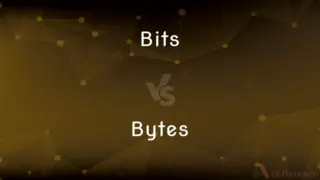DC Comics vs. Marvel Comics — What's the Difference?
By Tayyaba Rehman — Published on October 29, 2023
DC Comics, home to iconic heroes like Superman and Batman, emphasizes mythic, larger-than-life characters, while Marvel Comics, with characters like Spider-Man and Iron Man, often focuses on relatable, humanized superheroes.

Difference Between DC Comics and Marvel Comics
Table of Contents
ADVERTISEMENT
Key Differences
DC Comics and Marvel Comics are prolific publishers, creating myriad characters and stories that have shaped the comic book industry and pop culture. DC Comics, founded in 1934 as National Allied Publications, has created iconic characters such as Superman, Batman, and Wonder Woman, who often embody idealized, archetypal qualities and operate in settings that are, at times, as iconic as the characters themselves, like Gotham City. Marvel Comics, established in 1939 as Timely Publications, boasts characters like Spider-Man, Iron Man, and the X-Men, who often have human flaws and relatable problems, residing in real cities, primarily New York City.
Both DC and Marvel have massive, interconnected universes, but they approach them differently. DC Comics has a multiverse consisting of parallel universes, allowing for various interpretations and versions of its characters, creating diverse storylines and alternate realities. Marvel Comics, however, usually operates within a single, shared universe where its characters coexist, intersecting and teaming up in an intertwined narrative landscape, highlighting the interconnectedness of its characters and stories.
DC Comics often explores themes of hope, justice, and morality, exemplified by characters like Superman, who represents the ultimate do-gooder, a symbol of hope and moral integrity. Marvel Comics, in contrast, delves into the human condition, societal issues, and internal conflicts, portraying characters like Spider-Man, who struggles with everyday problems and moral dilemmas, making Marvel characters generally more relatable to readers.
The storytelling approach of DC Comics tends to be more stylized and grand, often dealing with god-like characters and epic, universal threats, creating a sense of awe and wonder. Marvel Comics typically employs a more grounded and realistic approach, focusing on character-driven stories and personal dilemmas, emphasizing the humanity of their superheroes.
In conclusion, while DC Comics and Marvel Comics share the common ground of being comic book publishing giants with extensive, rich universes and iconic characters, they differ significantly in their thematic focus, character development, setting, and storytelling approach. DC’s characters often represent ideals and archetypes, dealing with larger-than-life themes and moral questions, while Marvel’s characters are usually more human and flawed, grappling with relatable issues and moral complexities.
ADVERTISEMENT
Comparison Chart
Character Archetype
Idealized, larger-than-life characters
Relatable, humanized characters
Setting
Iconic, fictional locations
Primarily real-world locations, especially NYC
Themes
Hope, justice, morality
Human condition, societal issues, internal conflicts
Universe Structure
Multiverse with parallel universes
Single, shared, interconnected universe
Storytelling Approach
Stylized, grand, dealing with universal threats
Grounded, realistic, character-driven
Compare with Definitions
DC Comics
Features a multiverse consisting of parallel universes.
The multiverse in DC Comics allows for diverse storylines and character interpretations.
Marvel Comics
Emphasizes grounded, realistic, character-driven stories.
The storytelling in Marvel Comics often focuses on the humanity of their superheroes.
DC Comics
Known for characters who often represent ideals and embody archetypal qualities.
Characters in DC Comics like Superman often serve as symbols of hope and justice.
Marvel Comics
Operates within a single, interconnected universe.
Characters in Marvel Comics coexist and intersect within a shared narrative landscape.
DC Comics
Emphasizes stylized, grand storytelling with universal themes.
DC Comics often explores themes of hope and morality through its narratives.
Marvel Comics
Known for exploring the human condition, societal issues, and internal conflicts.
Marvel Comics delves into themes related to societal norms and the moral dilemmas of its characters.
DC Comics
Established in 1934 as National Allied Publications.
DC Comics has a long and storied history in the comic book industry.
Marvel Comics
Established in 1939 as Timely Publications.
Marvel Comics, originally Timely Publications, has evolved significantly over the decades.
DC Comics
A major publisher known for iconic characters like Superman and Batman.
DC Comics has created some of the most enduring characters in the genre.
Marvel Comics
A prolific comic book publisher known for characters like Spider-Man and Iron Man.
Marvel Comics has a rich roster of superheroes with human flaws and relatable problems.
Common Curiosities
Were DC Comics initially known as National Allied Publications?
Yes, DC Comics was initially founded as National Allied Publications in 1934.
Are Marvel Comics characters usually more relatable and humanized?
Yes, Marvel Comics often features characters with human flaws and relatable problems, making them more humanized.
Did Marvel Comics start as Timely Publications?
Yes, Marvel Comics was originally established as Timely Publications in 1939.
Does Marvel Comics operate primarily within a single, interconnected universe?
Yes, Marvel Comics typically operates within a single, shared universe where its characters coexist and intersect.
Is the storytelling in DC Comics often more stylized and grand?
Yes, the approach of DC Comics to storytelling is often more stylized, dealing with god-like characters and universal threats.
Does DC Comics employ a multiverse structure in its narratives?
Yes, DC Comics features a multiverse consisting of parallel universes allowing for varied interpretations of its characters.
Are societal issues and the human condition common themes in Marvel Comics?
Yes, Marvel Comics frequently explores themes related to the human condition, societal issues, and internal conflicts.
Does Marvel Comics primarily use real-world locations for its settings?
Yes, Marvel Comics often uses real-world locations, especially New York City, as settings for its stories.
Do DC Comics characters typically represent idealized, archetypal qualities?
Yes, characters in DC Comics often embody idealized, larger-than-life qualities representing archetypes.
Do DC Comics usually explore themes of hope, justice, and morality?
Yes, DC Comics often delves into themes of hope, justice, and morality through its characters and stories.
Are the settings in DC Comics often iconic and fictional?
Yes, DC Comics often sets its stories in iconic, fictional locations like Gotham City.
Do Marvel Comics characters usually struggle with relatable issues and moral complexities?
Yes, Marvel Comics portrays characters who are more human and flawed, dealing with relatable issues and moral dilemmas.
Does Marvel Comics focus more on grounded, character-driven stories?
Yes, Marvel Comics typically employs a more grounded and realistic approach, emphasizing character-driven narratives.
Do DC Comics characters often deal with larger-than-life themes and moral questions?
Yes, characters in DC Comics often grapple with epic themes and moral questions, representing ideals and archetypes.
Share Your Discovery

Previous Comparison
Sense Strand vs. Antisense Strand
Next Comparison
Bits vs. BytesAuthor Spotlight
Written by
Tayyaba RehmanTayyaba Rehman is a distinguished writer, currently serving as a primary contributor to askdifference.com. As a researcher in semantics and etymology, Tayyaba's passion for the complexity of languages and their distinctions has found a perfect home on the platform. Tayyaba delves into the intricacies of language, distinguishing between commonly confused words and phrases, thereby providing clarity for readers worldwide.













































